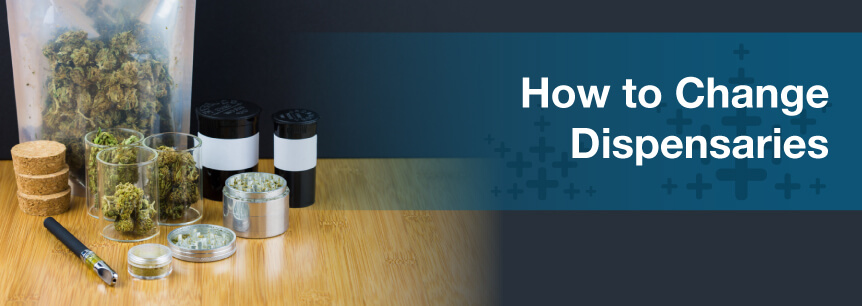
Medical marijuana patients rely on dispensaries to provide their medicine. But, sometimes a dispensary doesn’t work out for someone. If you were thinking about changing pharmacies, you can transfer a prescription online or by phone. But, not every state lets dispensaries make the process as easy as pharmacies can make it. State laws tend to regulate medicinal cannabis strictly, often requiring extra paperwork and steps to complete. In this guide, we’ll discuss what to consider when changing dispensaries and the most common ways state laws handle dispensary transfers.
Any state with dispensaries will let you change your primary dispensary — the difference lies in how complicated they make the process. Some states require little to no paperwork to buy medicine from a different provider. Meanwhile, others have an intensive process in place that takes time and effort. No matter where your state stands, making the switch is doable if you know what to do.
Patients wanting to get medicine from a different dispensary can have a variety of reasons for the swap, including:
No matter why you want to go to another dispensary, you’re making an important decision for your treatment.
If you decide to change dispensaries, make sure to do your research and consider your reasoning behind your decision. It might not be a big deal if you can easily register for a new provider, but some places make the change a time-intensive process. So, ask yourself these questions before switching:

Use online sources like our dispensary database to get as much knowledge as you can about menus, prices, customer service and other factors.
States like Calfornia and Nevada that have recreational dispensaries for adults over 21 generally let you change dispensaries with ease. If you use recreational stores already, you just have to go to another store and use your 21+ ID to buy medicine. However, we recommend getting a medical marijuana card so you have the option to shop at medical dispensaries and purchase medicinal-grade products. Patients who have medical marijuana cards may have to fill out a small amount of paperwork to join a new medical dispensary, but nothing too difficult. When you search for a new provider, remember to check if they offer medical services in the first place.
In states like New York and Minnesota that have only legalized medical marijuana, you may have to do some extra work compared to patients in recreational states. Certain states will let you visit any dispensary if you have a medical marijuana card, while others ask dispensaries to provide applications. Even in states that only require a medical cannabis card to switch, some dispensaries themselves require an appointment or paperwork before you can buy medicine.
However, certain states require you to officially designate a primary dispensary. In this scenario, you must get approval from the state department that manages cannabis medicine before you can get medication from a new location. Sometimes, your primary dispensary is noted on your patient card, making you wait until you get the new ID to visit. Dispensaries in these kinds of states are usually happy to help you out with the process, so feel free to call your prospective provider to see if they can lend a hand.
If you live near another state with legal cannabis, you might consider switching to a place in that state instead of your own. When that state has recreational marijuana, you can get cannabis as an adult, but you might only have the option to take your medicine within state lines. In a few states like Hawaii and Maine, you can complete a registration for out-of-state patients that temporarily lets you purchase medication. Maryland, a unique case, permits out-of-state patients to get marijuana-friendly medical services in their state and shop at their dispensaries.
You don’t have to figure out the world of medical marijuana dispensaries alone. Our up-to-date directory of dispensaries offers information on menus, locations, application requirements and more.
No Information on MarijuanaDoctors.Com should be used to diagnose, treat, prevent or cure any disease or condition. You can view our Full Disclaimer here.